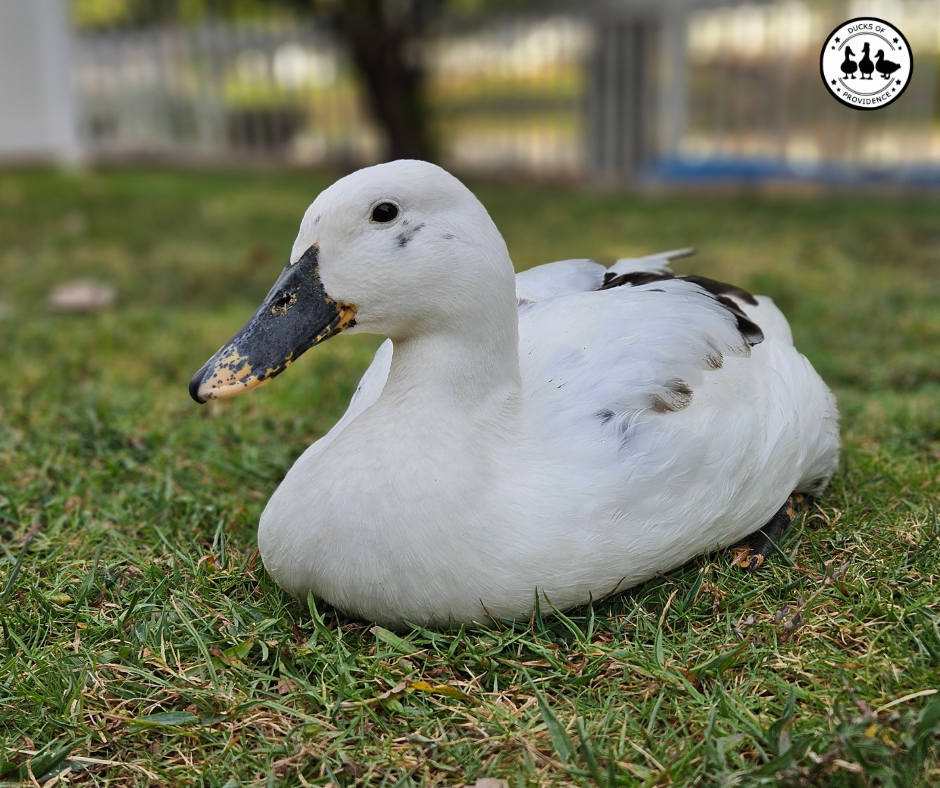
Do Ducks Get Lonely? How to Keep Your Pet Ducks Happy and Social
Last updated on January 19th, 2026 at 02:45 pm
Yes, ducks do get lonely. Ducks are deeply social animals that depend on companionship to feel safe and content. In nature they live in flocks, communicating constantly and relying on one another for warmth, protection, and emotional balance. Pet ducks share these same instincts. When a duck is kept alone, it misses the constant company and comfort that come from living with others of its kind.
Understanding the social behavior of ducks is essential for keeping them healthy and happy. Whether you have a backyard flock or one cherished pet, providing the right social environment makes a world of difference.
Ducks of Providence is free, thanks to reader support! Ads and affiliate links help us cover costs—if you shop through our links, we may earn a small commission at no extra cost to you. Thanks for helping keep our content free and our ducks happy! 🦆 Learn more
Part of the Community & Behavior Hub, Exploring the social complexity and psychological needs of domestic ducks.
The Social Nature of Ducks
Ducks are flock animals by nature, and their entire way of life revolves around companionship and cooperation. In the wild, they spend nearly every moment surrounded by other ducks. They forage together, bathe together, and rest in groups where each bird helps watch for danger. Living in a flock is not only about protection. It also provides emotional comfort, structure, and a sense of belonging.
Ducks are highly communicative animals. They express themselves through a wide range of sounds, from gentle murmurs to loud quacks. Each vocalization carries meaning. Some sounds call others to food or water, while others warn of threats or simply express contentment. In addition to sound, ducks rely on body language such as head movements, wing displays, and gentle nibbling to share affection or set boundaries.
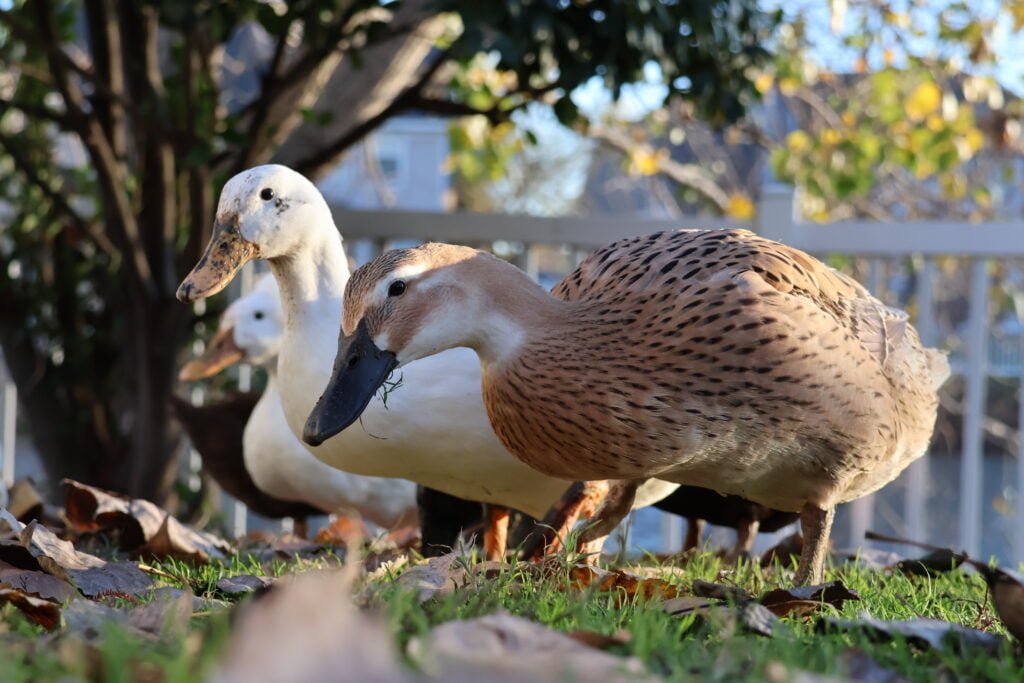
Ducklings begin learning social behavior as soon as they hatch. Their first instinct is to seek warmth and company. This process, called imprinting, creates a deep emotional attachment to the first moving creature they see. In nature that is usually their mother, but in a human home it might be a person or another animal. Imprinting teaches ducklings who to follow and how to interact with the world around them.
Within a flock, ducks form lasting bonds. They often have favorite companions and can recognize each other even after being apart for a long time. Research and real-life observation show that ducks can sense the emotions of those around them. When one duck becomes nervous or stressed, others in the flock often respond in the same way. Likewise, calm behavior helps the entire group remain peaceful.
These strong social instincts remain for life. Ducks feel happiest when they are part of a small group where they can preen one another, nap close together, and move as a team. Shared activities, such as foraging or swimming side by side, reinforce their connection and promote emotional balance.
For pet ducks, companionship is not optional. Even a single duck raised with care will crave interaction and comfort from others. While human caretakers can offer love and attention, only another duck can truly speak the same language. Providing a companion allows your ducks to express natural behaviors, which leads to happier and healthier lives.
Signs That a Duck Is Lonely
A lonely duck often shows clear and sometimes heartbreaking changes in behavior. Because ducks are such social and emotionally aware animals, isolation affects them deeply. Paying attention to even subtle signs can help you recognize loneliness before it leads to more serious stress or health problems.
1. Constant calling or loud quacking
When a duck feels lonely, it will often call out repeatedly as if searching for a missing friend. These vocalizations are not random. They are attempts to locate flock members or to draw attention from anyone nearby. Some ducks become especially noisy at dawn or dusk when they would normally settle with their group.
2. Following humans or other animals everywhere
A single duck will often attach itself to a person, dog, or other animal as a substitute companion. This can look endearing at first, but it usually signals that the duck is desperate for company. It may follow you from room to room or wait by the door when you leave. While affection toward humans is natural, excessive dependence points to loneliness.
3. Loss of appetite or reduced interest in food
Social eating is an important part of duck life. Ducks often eat more readily when others are nearby. A lonely duck may lose interest in food or show less enthusiasm during feeding time. Prolonged loss of appetite can lead to weight loss and nutrient deficiencies, so this sign should never be ignored.
4. Restlessness and pacing
A duck that feels isolated often walks in circles, paces along the fence, or shows repetitive movements without purpose. This restless behavior is a response to frustration and lack of stimulation. Ducks are active thinkers and problem solvers, and boredom can quickly turn into stress when they are alone.
5. Excessive preening or feather picking
Grooming is a normal part of daily life for ducks, but when done too frequently or aggressively, it can become harmful. Lonely ducks sometimes overpreen or pluck at their feathers because they lack the comfort and social interaction that usually occupy their attention. Over time this can cause bald spots or skin irritation.
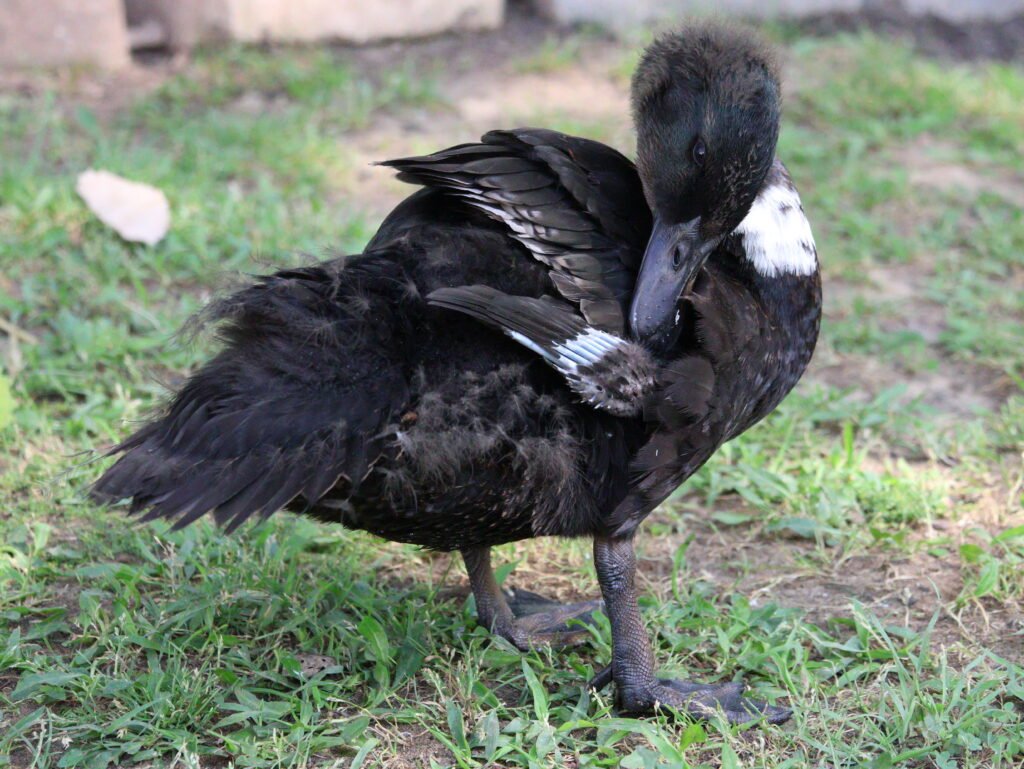
6. Withdrawal or lethargy
Not all lonely ducks act out through noise or movement. Some become unusually quiet and withdrawn. A duck that spends long periods sitting alone, avoiding the water, or showing little curiosity may be struggling emotionally. This subdued behavior often indicates sadness or fatigue resulting from isolation.
7. Aggression or irritability
Loneliness does not always appear as sadness. Some ducks react with irritation, pecking at their caretaker or lashing out when approached. This behavior can be mistaken for bad temperament, but it often stems from unmet social needs and the frustration of being alone.
8. Changes in sleep habits
Ducks are comforted by sleeping close to others. A lonely duck may stay awake longer, nap at odd times, or appear unsettled during rest. Without the safety of a flock, it may remain on alert or sleep less deeply, which can weaken its overall health.
Recognizing these signs early allows you to take steps to improve your duck’s emotional well-being. Providing a feathered friend or increasing social interaction can quickly transform behavior. A duck that once seemed restless or unhappy often becomes calm and content once it has companionship again.
Can Ducks Bond With Humans?
Ducks can form remarkably strong bonds with humans. Anyone who has raised ducklings or spent time with adult pet ducks knows how affectionate and trusting they can become. They learn faces, voices, and routines, and they often show genuine excitement when their favorite person approaches. Some ducks even greet their caretakers with happy tail wags, soft chatter, or by running to the door as soon as they hear footsteps.
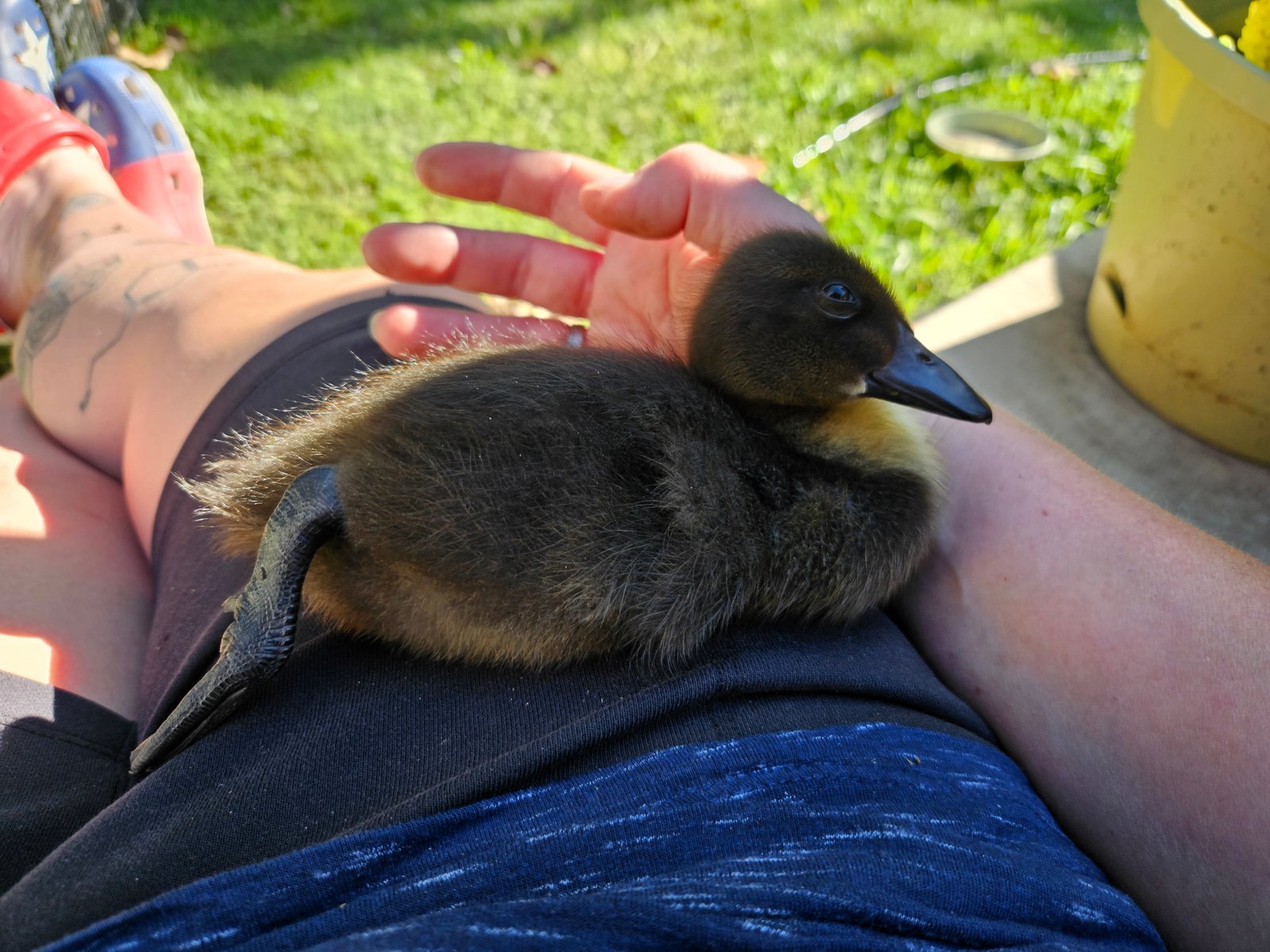
This deep connection begins early in life. Ducklings go through a stage called imprinting, when they attach to the first moving being they see after hatching. In the wild, that is usually their mother, but in a human home, it is often their caretaker. This imprinting shapes their sense of safety and belonging. A duck that imprints on a person sees that person as part of its flock and will seek closeness, comfort, and protection from them.
Many pet ducks continue to maintain these bonds well into adulthood. They enjoy gentle petting, sitting nearby while you work or relax, and even following you around the yard. They may nibble softly at your fingers or clothing, which is their way of showing affection and curiosity. Some ducks choose to nap near their owners or prefer to eat only when their caretaker is present, a sign of trust and companionship.
However, while human bonding is beautiful and meaningful, it cannot fully replace the companionship of another duck. Ducks communicate in ways that humans cannot mimic. They have an entire language of sounds, gestures, and behaviors that strengthen their social ties. Ducks preen each other, swim together, and share quiet resting time that satisfies instincts deeply rooted in their nature.
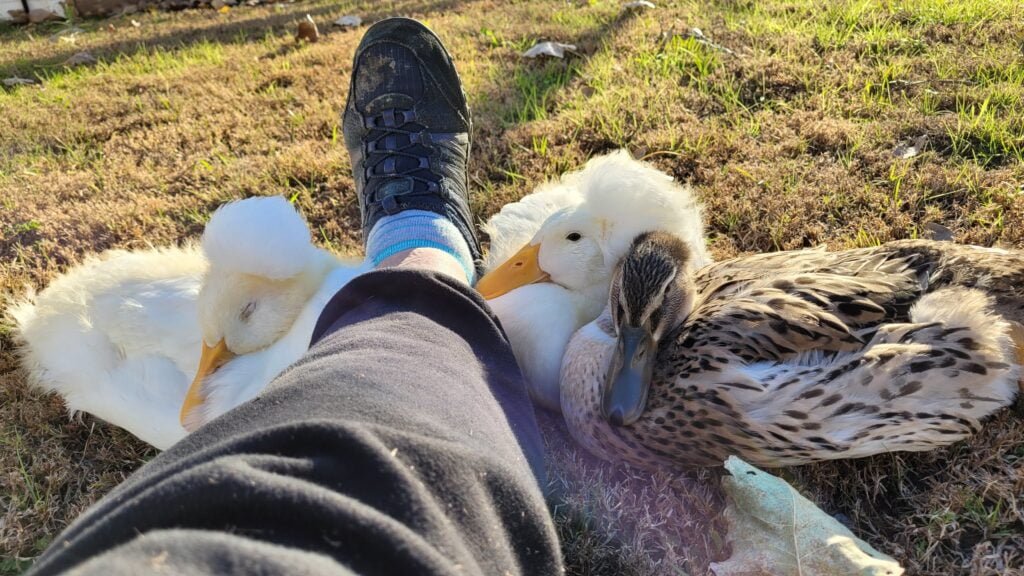
A single duck that bonds only with a human may still feel lonely when left alone for long periods. Ducks need near-constant social interaction, something a human simply cannot provide every hour of the day. Even with plenty of love and attention, most ducks benefit greatly from having at least one feathered friend. Companionship allows them to engage in natural behavior and reduces stress, especially when their caretaker is not nearby.
For duck keepers, the best approach is balance. Nurture the bond with your duck through daily contact, gentle handling, and time spent together, but also ensure that your duck has another of its kind for company. A bonded pair or small group will share affection with each other and still seek comfort and friendship from you. This mix of human and duck companionship creates the happiest and most emotionally secure environment possible.
How Many Ducks Should You Keep?
Because ducks are flock animals, keeping just one is rarely ideal. Even though a single duck can survive with plenty of human care, it will not truly thrive without a companion of its own kind. Ducks depend on social contact for comfort, communication, and emotional balance. Providing them with at least one feathered friend is one of the most important parts of responsible duck keeping.
The ideal number of ducks depends on your space, resources, and goals, but most backyard keepers find that two or three is a manageable and happy number. A pair of ducks can form a close bond and will spend nearly all their time together. They will preen side by side, share food, and sleep close to one another. If one leaves the area, the other will often call until it returns. Watching their friendship develop is one of the most rewarding parts of keeping ducks.
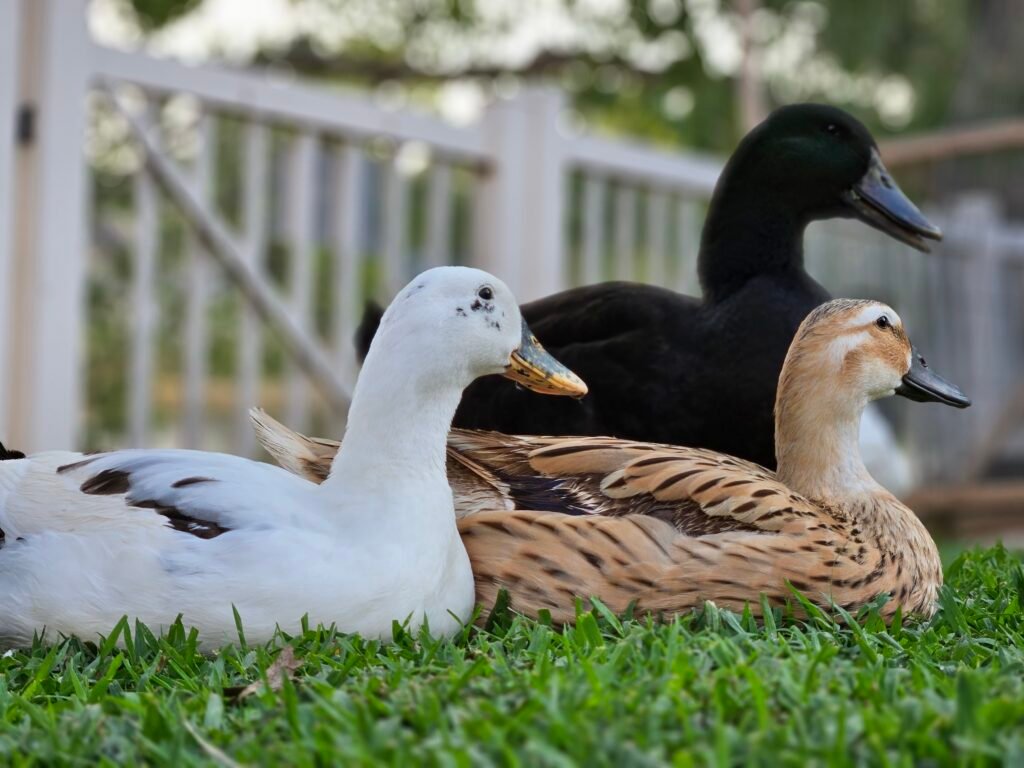
When choosing how many ducks to keep, it is also important to consider their gender. Two females usually make an excellent pair and will live together peacefully. If you have a male, he should always have more than one female companion. A ratio of one drake to at least three to four females helps prevent overmating and allows all ducks to remain relaxed. Alternatively, you can also have a small group of males, known as bachelor flocks. Too many males together in mixed flocks often leads to fighting and stress, especially during breeding season.
Ducks also benefit from living in small groups of three to six. This mimics the natural social structure found in the wild and helps them feel secure. Within a small flock, ducks often form smaller friendships and establish a gentle pecking order that keeps harmony in the group. A balanced flock provides more stimulation and opportunities for play, exploration, and grooming.
If you already have a single duck, introducing a new companion can make a tremendous difference. Many duck keepers notice immediate changes when their lonely duck finally meets another of its kind. The calling stops, appetite improves, and energy levels increase. However, introductions must be handled carefully to avoid stress and territorial behavior.
Start by keeping the new duck separate but within sight of your existing one. A fence or divider allows them to observe and communicate safely without direct contact. This helps them get used to each other’s presence. After a few days, allow short supervised visits in a neutral space such as a grassy area or small pen. Continue these sessions until they appear calm and comfortable together. Some ducks bond instantly, while others take more time. Patience and observation are key.
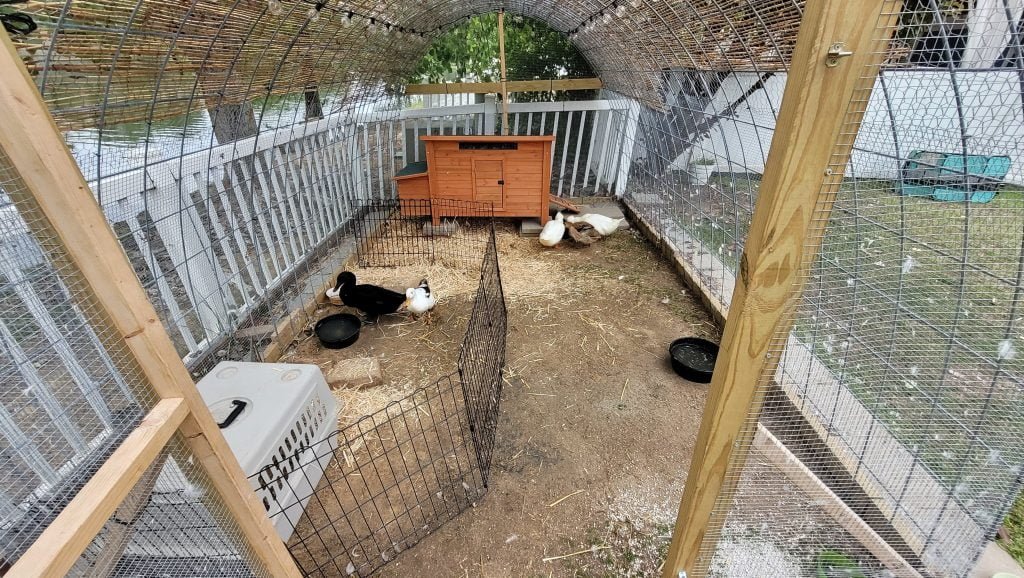
It is also important to quarantine any new duck for at least two weeks before bringing it into your flock. This precaution protects your current ducks from potential illness and gives the newcomer time to adjust to its new environment. During this period, provide separate housing, feed, and water but maintain visual contact to encourage social familiarity.
Once your ducks are safely integrated, you will quickly see how much happier and more relaxed they become. They will communicate constantly, share space peacefully, and even comfort one another during stressful moments such as storms or loud noises. Watching a pair or small group interact naturally is one of the best reminders that ducks are meant to live and love as part of a flock.
Enrichment for Social and Emotional Health of Ducks
Ducks are intelligent, curious, and active animals. Even when they live in pairs or small flocks, they still need stimulation to stay engaged and emotionally balanced. Enrichment helps prevent boredom, reduces stress, and encourages natural behavior. A well-enriched environment gives ducks opportunities to explore, communicate, and express their instincts in positive ways.
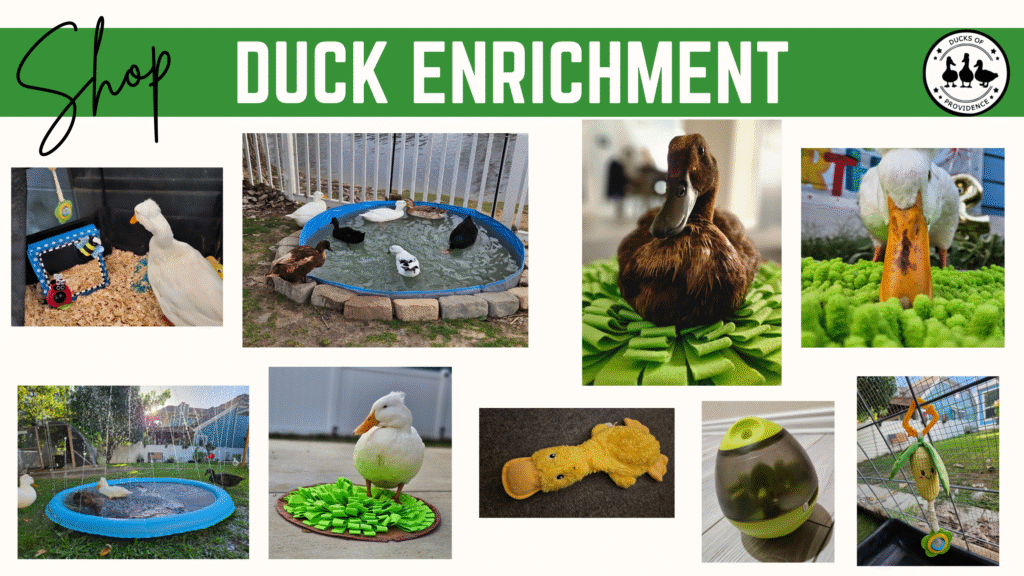
Provide access to water for swimming and play
Water is essential to a duck’s happiness. Swimming, splashing, and dabbling are not only forms of exercise but also important social activities. Ducks often bathe and preen together, which strengthens their bonds. If you do not have a pond, a large kiddie pool or stock tank works beautifully. Keep it filled with clean water and make sure your ducks can enter and exit easily. Adding a few floating treats like peas or chopped greens turns bath time into an enriching foraging game.
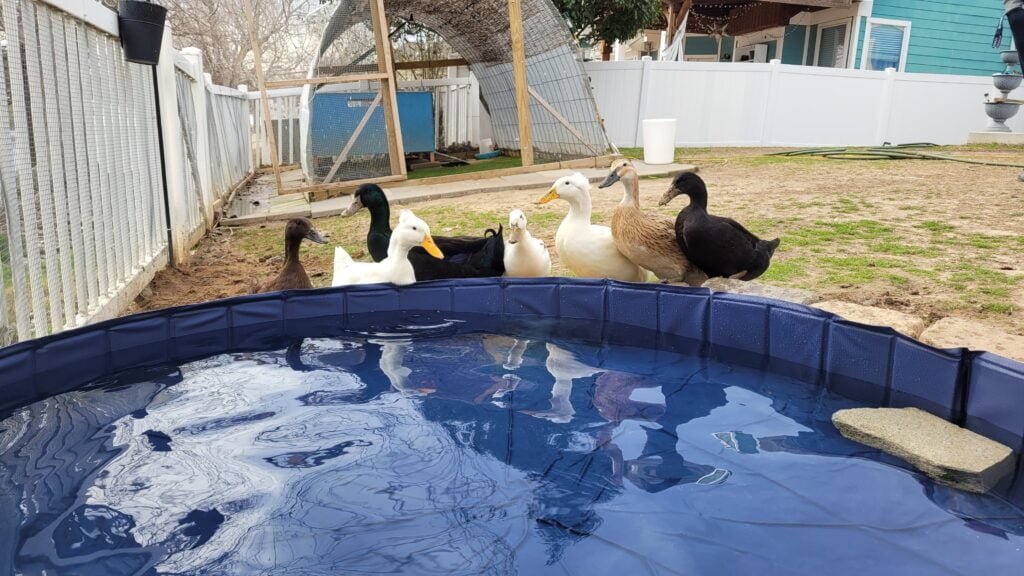
Encourage natural foraging behavior
In nature, ducks spend a large part of their day searching for food. You can mimic this by scattering their feed, mealworms, or small vegetables in the grass or shallow water. This encourages gentle digging and dabbling, which keeps them active and satisfied. You can also create small foraging trays filled with clean sand, shredded lettuce, or bits of cucumber to keep them busy indoors or during rainy days.
Offer safe toys and objects to explore
Ducks love novelty and will investigate anything new. Simple items such as balls, mirrors, or shallow pans of water with floating objects can capture their curiosity. Hanging leafy greens from a low branch or a safe hook gives them a fun challenge as they nibble and pull. Rotating these items every few days keeps things interesting and prevents boredom.
Create space for relaxation and comfort
While ducks enjoy being active, they also appreciate a calm, safe space where they can rest together. Provide shaded areas in the run where they can nap undisturbed. A cozy corner with soft bedding and a gentle breeze helps them feel secure. Ducks like to rest close to their companions, so make sure the space is large enough for everyone to sit together comfortably.
Add sensory variety
Different textures and surfaces give ducks new experiences that stimulate their senses. You can include areas with short grass, smooth stones, or soft turf for them to walk on. Providing shallow puddles or mud patches after rain also satisfies their natural love for exploring wet ground. Just make sure the area drains well and stays clean to avoid muddy buildup.
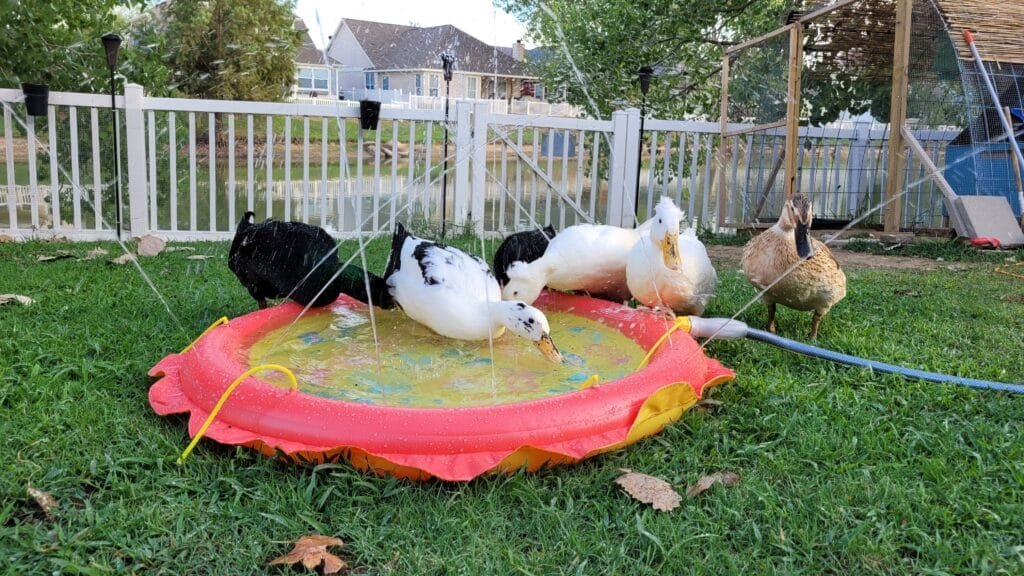
Promote social interaction
Many enrichment activities work best when done as a group. Swimming, foraging, and exploring together strengthen relationships within the flock. You can also encourage bonding by giving treats in shared bowls or setting up spaces where ducks can preen side by side. Shared experiences reinforce their natural social rhythm and create harmony among flock members.
Spend time with your ducks
Human interaction is also enriching for pet ducks, especially those that are bonded with their caretakers. Talking to them, offering gentle pets, and observing their behavior helps build trust. Ducks quickly learn to recognize voices and routines, and they respond well to calm, positive energy. Spending just a few minutes a day interacting with your ducks can greatly improve their overall happiness.
Enrichment is not about providing expensive toys or complicated setups. It is about understanding what makes ducks feel fulfilled and giving them the opportunity to act on those instincts. A mix of social time, water play, foraging, and gentle companionship creates a balanced and stimulating environment. When ducks have the freedom to explore, interact, and rest safely, they live more vibrant and joyful lives.
Special Cases: When a Duck Must Live Alone
There are times when a duck may have to live alone, even if only for a short period. The loss of a companion, an injury, or a health condition can make separation unavoidable. In these moments, it is especially important to understand how deeply social ducks are and how to support them through isolation. With extra care and attention, a duck can feel safe, loved, and comforted even when separated from its flock.
When a flock member passes away or is lost to a predator
Losing a companion can be devastating for both the keeper and the surviving duck. Ducks grieve. They notice when a flockmate disappears and often call for them or search the area for days. During this time, your duck may seem restless, quiet, or confused. Offer gentle reassurance and spend extra time nearby. Talk softly, provide treats, and keep their routine as normal as possible to give them a sense of stability.
It can help to place a mirror in their space so they see movement and reflection, which provides some comfort. A stuffed animal or soft blanket may also bring calm, especially for ducks that were closely bonded with a companion. Whenever possible, consider introducing a new friend once your duck has had time to adjust. A gradual and thoughtful introduction can bring back balance and joy to their life.
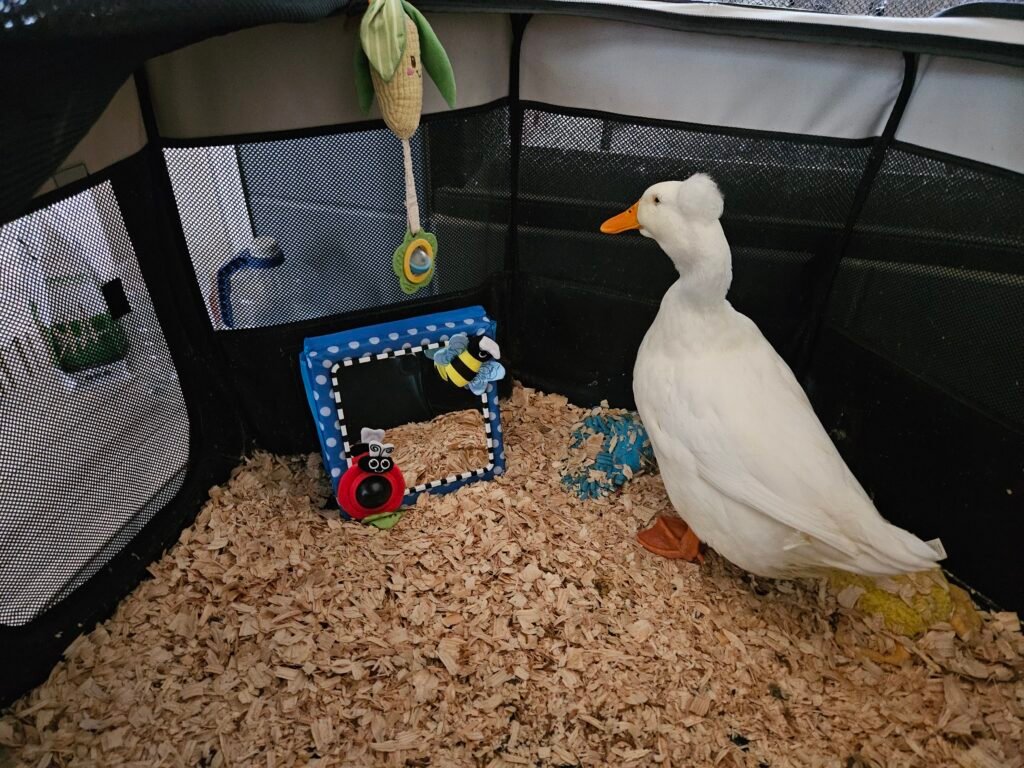
Caring for disabled ducks
Some ducks live with permanent disabilities that affect their movement, balance, or coordination. These ducks often need to stay indoors or in smaller, safer areas for protection and comfort. Being inside, however, can limit their social interaction and may lead to loneliness if not managed carefully.
To support a disabled duck, keep them in a bright area where they can see and hear you often. Talk to them throughout the day so they feel included. If your duck enjoys gentle contact, allow it to sit near you while you work or relax. A soft bed, warm lighting, and easy access to food and water make their environment safe and inviting.
If possible, allow short visits or visual contact with the rest of the flock through a door or window. Many ducks find comfort in hearing familiar quacks or seeing their friends outside. Some keepers even set up safe playpens or supervised outdoor time so disabled ducks can enjoy the fresh air and sunshine while still being protected.
Helping sick ducks through recovery
When a duck becomes ill or injured, isolation is sometimes necessary to prevent the spread of disease or to allow proper rest and healing. However, this separation can make a duck feel anxious and lonely. Ducks thrive on social presence, so being alone during illness can be stressful.
Keep the recovering duck in a quiet, comfortable area where they can see or hear you often. Frequent gentle visits make a big difference. Offer favorite foods by hand to encourage eating and provide emotional comfort. Keep mirrors nearby for visual stimulation and soft toys or blankets for warmth.
If the duck is stable enough, consider setting their pen close to the outdoor enclosure so they can hear their flock. Once they are fully recovered, reintroduce them slowly, allowing visual contact first before full access. This helps avoid stress and ensures they are accepted smoothly back into the group.
Emotional support and routine
In every case, maintaining routine helps ducks feel secure. Feed and interact with them at consistent times. Use a calm voice, and give them positive stimulation such as music, light foraging games, or gentle water play if their condition allows. Remember that ducks sense emotions. Your calm presence can greatly ease their stress during lonely times.
While it is always best for ducks to live among others, life sometimes brings circumstances we cannot control. With patience, creativity, and compassion, you can help your duck feel loved and connected even when they must spend time alone. Your understanding and gentle care will make all the difference in their recovery and emotional well-being.
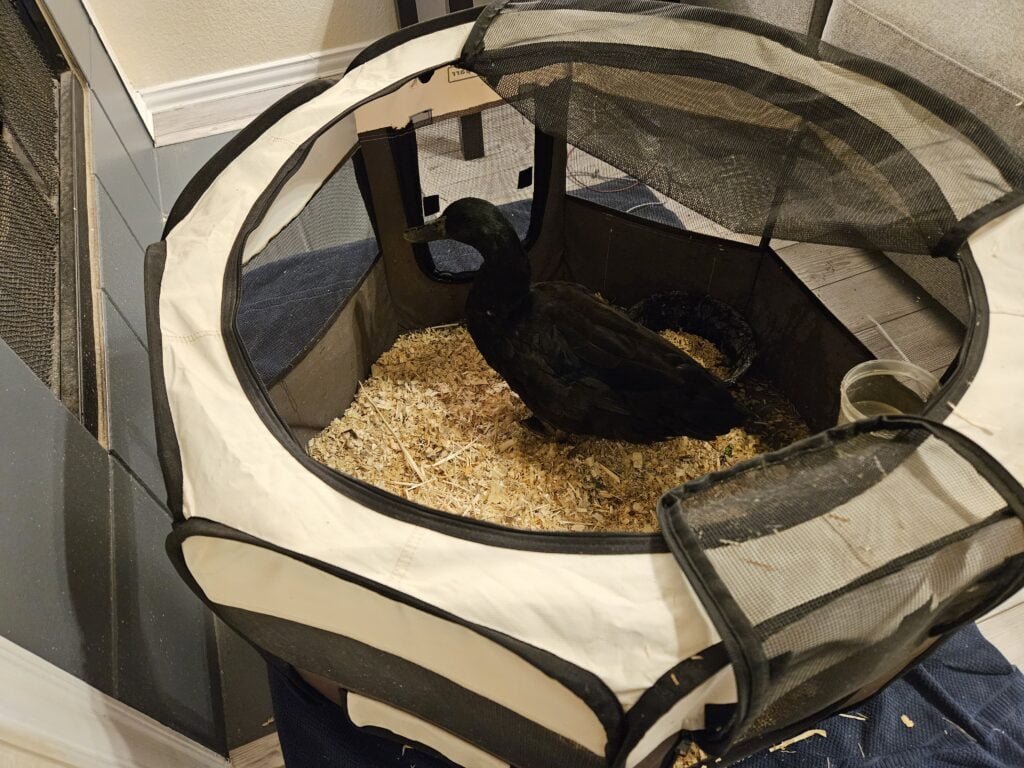
Frequently Asked Questions
Can ducks live alone if they have a lot of human attention?
Even with plenty of love and care, a single duck will still miss the company of its own kind. Humans can offer comfort and companionship, but they cannot fully replace another duck. Ducks need interaction in their own language, such as preening, swimming, and resting side by side. A feathered friend ensures your duck feels truly understood and secure.
Can different duck breeds live together?
Yes, most domestic duck breeds get along well as long as their sizes and temperaments are compatible. It helps to introduce them gradually and provide enough space for everyone to eat, rest, and move comfortably. Avoid mixing aggressive males with smaller or timid ducks, as this can cause stress or injury.
How do I introduce a new duck to my existing one?
Start by keeping the new duck in a separate but visible area so they can see and hear each other. After a few days, allow short supervised visits in a neutral space. Increase the time they spend together slowly. Ducks often form bonds quickly once they feel safe, but patience is key to a smooth introduction.
What should I do if my duck rejects a new companion?
Some ducks need extra time to accept a newcomer, especially if they have lived alone for a while. Continue short, calm interactions and offer treats when both ducks are near each other to build positive associations. If tension persists, try giving them separate sleeping spaces at night and more daytime exposure until they bond.
Can ducks form bonds with other animals?
Yes, ducks sometimes bond with gentle pets such as dogs, rabbits, or chickens. However, these relationships should always be supervised. Other animals do not communicate the same way ducks do, so they should never be a full-time substitute for another duck companion.
What if I cannot get another duck right away?
If you cannot add a new duck immediately, increase your interaction as much as possible. Provide enrichment such as mirrors, toys, and foraging activities. Keep your duck close to household activity so they do not feel isolated. Plan to find a companion as soon as your situation allows.
How can I tell if my duck is happy again after feeling lonely?
A happy duck is active, vocal, and curious. You will notice more relaxed body posture, healthy preening, and playful behavior like dabbling or gentle tail wags. Eating regularly, bathing, and resting comfortably are all signs that your duck feels safe and content once more.
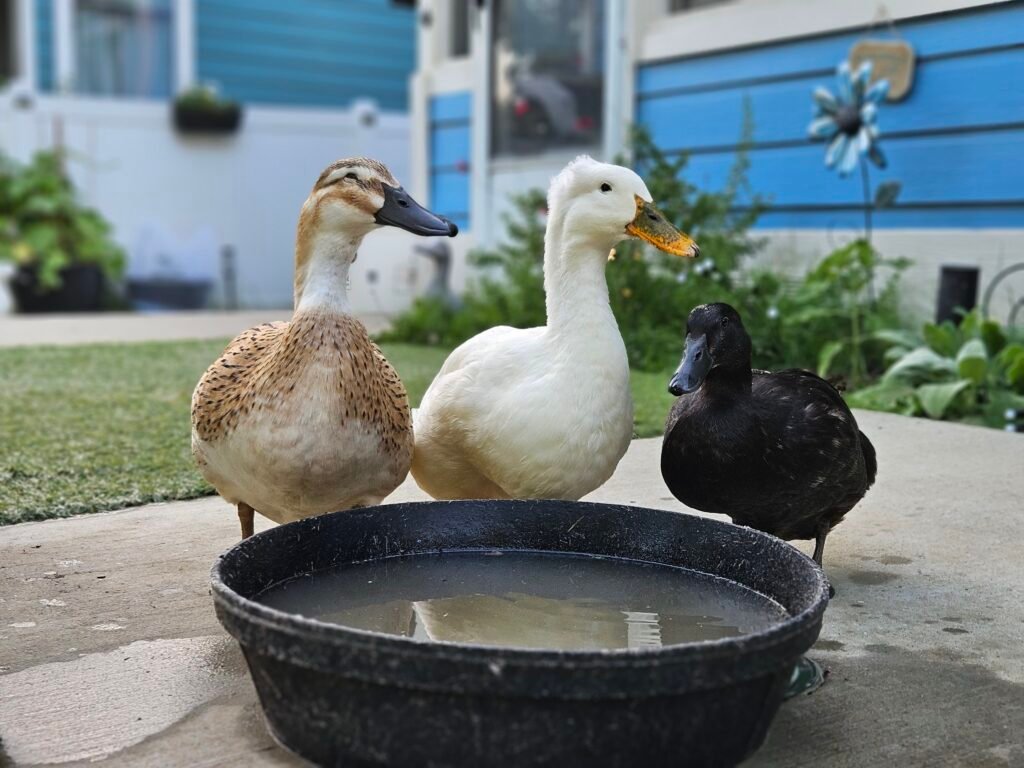
Final Thoughts
Ducks are not just flock animals by instinct. They are emotional beings who find joy, safety, and balance through companionship. Whether they live in large groups, pairs, or share a quiet home with their favorite human, ducks need connection to thrive.
A lonely duck may survive, but it will never reach the same level of happiness or health as one surrounded by friends. Companionship, enrichment, and daily care form the foundation of a duck’s well-being. Even in special cases such as illness, disability, or the loss of a flockmate, there are many ways to bring comfort and restore their sense of belonging.
As duck keepers, we have the privilege of watching these bonds form and grow stronger each day. Their quiet trust, their calls of recognition, and their joyful splashes remind us that love and friendship come in many forms. When we give ducks what they need most, companionship, safety, and understanding, they return it with affection that feels pure and enduring.
Every happy quack, every shared nap, and every gentle nuzzle is proof that ducks are at their best when they are never truly alone.
Connect deeper with your flock. Discover more about duck psychology and social dynamics in the Community & Behavior Hub.
Related Articles
- Duck Quacking Explained
- Pet Ducks: How Many should I have? And where do I get them from?
- Male vs Female Ducks Explained: From Bills to Behaviors
- Duck Personalities – What They Reveal About Our Ducks (and Us!)
- Does my Duck Like Me? 12 Signs Your Ducks Love and Trust You
- Can You Keep Ducks Indoors as a House Pet?
- Ducks and Other Pets: Can They Live Together?
- Enrichment and Toys for Ducks
